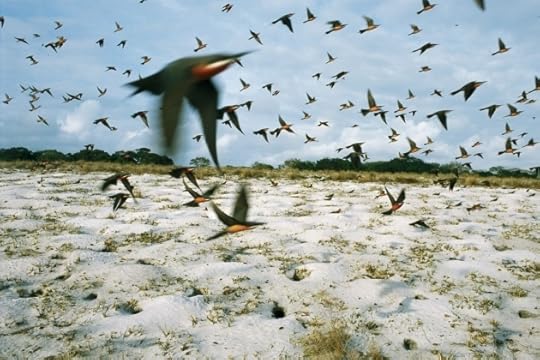Sean Jacobs's Blog, page 670
March 11, 2011
BBC: "Is Homosexuality Un-African?
This weekend the BBC World Service (on satellite TV and its radio service) will broadcast an edited version of a debate on gay rights in Africa. The debate was taped in Johannesburg, South Africa." The key focus of the debate was: " Is Homosexuality Un-African?" Yes. I know. However, the pre-publicity suggests it would also tackle more useful questions:
What is the evidence of pre-colonial gay and lesbian people in Africa? Is there any evidence to back up the claim that Westerners are importing or recruiting Africans to homosexuality? Is there evidence instead that modern-day Christian evangelists are the ones importing homophobia to the continent?
Who has the right to define what is acceptable culturally or ethically in Africa? Do religious leaders have a monopoly on ethics? How should traditions be interpreted or adapted to serve present-day African societies?
If it's not possible to reconcile some religious beliefs with sexual diversity and freedoms, is it at least possible for diverse views and practices to be tolerated. How do we build a society in which diversity is embraced and difference is not seen as a threat? Isn't this quite simply a human rights issue?
The panelists were David Bahati, the author of the Anti-Homosexuality Bill in Uganda (see more on his bigotry, here), former Botswana President Festus Mogae, Eusebius Mckaiser (gay rights activist and lecturer in South Africa), Paula Akugizibwe (Rwandan and from the Aids Rights Alliance for Southern Africa) and Sideeqah Tunde-Lawal (a leader of the Ansar'U-Deen Youth Association of Nigeria). The host is the Sudanese-born Zeinab Badawi.
Here are the listed viewing times:
BBC World News Television:
Saturday 12th March, 09:10 GMT
Saturday 12th March, 22:10 GMT
Sunday 13th March 15:10 GMT
It will also be broadcast on BBC World Service Radio.
Saturday 12th March 18:06 GMT
Sunday 13th March 13:06 GMT
If you can't make it, sometime next week the South African site My Big Debate–it has produced similar programs for South Africa's ETV–will put the edited debate on its website.
* The image is from Benedicte Desrus' Persecution of Homosexuality in Uganda, on show in New York City from next week onwards.








Writing Johannesburg Into Beginning
Tidal Waves Goes South
Anyone who makes songs about politicians eating all the money–what else do they do?–gets our vote. South African rock-reggae band, Tidal Waves (see also our earlier post) will be touring in the U.S. the next two weeks. Only in the American South, apparently, but don't miss them if you're around and you're in for some rock-n-reggae.








Tidal Waves Go South
Anyone who makes songs about politicians eating all the money–what else do they do?–gets our vote. South African rock-reggae band, Tidal Waves (see also our earlier post) will be touring in the U.S. the next two weeks. Only in the American South, apparently, but don't miss them if you're around and you're in for some rock-n-reggae.








Even the Elephants Fled to Kenya
Josephine Ablang, the very young Minister of Finance, Trade, and Industry from Eastern Equatoria State in South Sudan, and Zeinab Yassim, Special Advisor to the Governor of Eastern Equatoria on Gender and Human Rights Issues, are in the US, on a mission to sell their new country. They arrive hours later than planned at the college where I teach–we are told that they were late because of "different international systems" (a polite way to say that they are on "African Time"). When Her Excellency Ms Ablang takes the floor, she is quick to correct: we are not late because of "different international systems" – but because she is feeling quite sick: it is a matter of different weather systems.
It's not just the Sudanese who find her youth to be a surprise: when H.E. Ablang arrived in the US, many people said, "Oh. You are the Finance Minister?" She explained that in her culture, age is associated with responsibility – but she alters that understanding, by adding that it is the ability to step up to responsibility that makes one responsible. She is 38 years old, and here in the US, doing PR for her country, selling investment possibilities, including petroleum in Lafon, gold in Kapoeta, and tourism: vast swathes of land set aside for wildlife parks. In Kidepo National Park, elephants (which had fled south to Kenya, just as the people had done, during the war) are returning.
The challenges are many: the most pressing of which are to do with the cost of materials fundamental to "development" (everything is imported, including concrete, which means that even the cost of building a simple structure is prohibitive) and education. 80% of women are not educated. Most who are educated were refugees who went to formal schools and universities abroad – in Kenya, in Europe, in the US. Both officials are quick to emphasise women's role in the war – whether it was cooking for the warriors, being active combatants themselves, or by being educated abroad, in readiness for running the country they hoped for.
Above, H.E. Ablang addresses why the South Sudanese government has to prioritise the challenges they must address: infrastructure, health and education come first.
Later, I ask Ms. Yassim about what they think of the Cloony-wagons circling Sudan; she is too smart to criticise: she says, essentially, that as emissaries of South Sudan, they are here in the US to tell their own story.
Neelika Jayawardane; Mohamed Elsafty (on camera)








The Beautiful Game
You don't have to be a football fanatic or support Tottenham Hotspurs of the English Premier League, but you will enjoy this piece of animation of English player Gareth Bale's goals over two legs in the Champions League round of sixteen against Inter Milan, the defending champions. As a result, Tottenham are through to the quarterfinals.
The animation is by Richard Swarbrick.
* Tottenham has the African players Steven Pienaar, Sebastian Bassong and Benoit Assou-Ekotto under contract.








'Africa's First World Cup' Revisited
We're allowed to talk about the 2010 World Cup until 2014. Later today our man, historian of African soccer, Peter Alegi, will deliver the keynote address at the 7th Sports in Africa Symposium at Ohio University. Since few of us are in Athens, don't panic: The whole thing–including Peter's keynote–will be webcasted live here. Here's the description:
Peter Alegi – Michigan State University
From Marginalization to Global Citizenship: Africa's First World Cup in Historical Perspective
The day after Spain defeated The Netherlands in the World Cup final at the Soccer City in Johannesburg, global media celebrated South Africa's successful hosting of the planet's greatest sporting event. "South Africa's triumph in being host to the World Cup can no longer be questioned," wrote the International Herald Tribune. South African media were inundated by a tidal wave of self-congratulatory statements much like Mark Gevisser's "We did it, we showed the world." Other local commentators saw the World Cup as a Steve Biko-like moment of black pride, achievement and self-awareness.
Alegi's lecture reflects more deeply on the ways in which the 2010 World Cup fits into a long history of Africa's contributions to the globalization of soccer, from colonial times to the present. His scholarly assessment of the 2010 World Cup's impact on South Africa should deepen our understanding of the intertwined nature of soccer, politics, business, and culture in twenty-first-century Africa.








Africa's First World Cup
We're allowed to talk about the 2010 World Cup until 2014. Later today our man, historian of African soccer, Peter Alegi, will deliver the keynote address at the 7th Sports in Africa Symposium at Ohio University. Since few of us are in Athens, don't panic: The whole thing–including Peter's keynote–will be webcasted live here. Here's the description:
Peter Alegi – Michigan State University
From Marginalization to Global Citizenship: Africa's First World Cup in Historical Perspective
The day after Spain defeated The Netherlands in the World Cup final at the Soccer City in Johannesburg, global media celebrated South Africa's successful hosting of the planet's greatest sporting event. "South Africa's triumph in being host to the World Cup can no longer be questioned," wrote the International Herald Tribune. South African media were inundated by a tidal wave of self-congratulatory statements much like Mark Gevisser's "We did it, we showed the world." Other local commentators saw the World Cup as a Steve Biko-like moment of black pride, achievement and self-awareness.
Alegi's lecture reflects more deeply on the ways in which the 2010 World Cup fits into a long history of Africa's contributions to the globalization of soccer, from colonial times to the present. His scholarly assessment of the 2010 World Cup's impact on South Africa should deepen our understanding of the intertwined nature of soccer, politics, business, and culture in twenty-first-century Africa.
The full program.








March 10, 2011
These People Have Been Contacted
Wired.com, which usually knows better, has a photo gallery on its site that "takes you on a tour" of "the last uncontacted people." What drove them to publish the images are "the release … last week of a tribe in southwest Brazil." And because publishing images of people who didn't necessarily permit their bodies and images to be used is for our collective good. The writer notes that most of these "uncontacted tribes" (he slips between "tribes" and "people" a lot) live in the Amazon, but also India and Peru, and "are often described as living fossils of Stone Age life, flash-frozen in time." The post contains this disclaimer: "… Such descriptions are unfair: We don't really know how people lived in the Stone Age, and there's no reason to think that uncontacted cultures have not continued to evolve in their own unique ways." It also contains "an Editor's Note" accompanying a photo of "the tribe in southwest Brazil": the machete in the photograph was likely obtained through trade with Indians who have made contact." I also got my bread knife from some people who made contact with the local Walmart – who made contact with some people making knives in China.
Nevertheless, none of these disclaimers and hand-wringing acknowledgements stop them from putting up the gallery. They clearly knew what they are doing. The long comments thread suggests that the anticipated pageview numbers drove this kind of nonsense.
Often, our desires for Prelapsarian locations are maintained via the otherwise well-meaning discourses surrounding land conservation and "rights-protection" meant to maintain the Primitive as primitives: that is, peoples without the ability to negotiate their place in modernity. We connect ourselves – through these mythologies that employ a very "National Geographic" image bank of the "Primitive" and their undisturbed and isolated landscapes – with the powerful desire to return, at least symbolically and temporarily, to Edenic locations, wherein magical ways of life that promise to erase the malaises of post-industrial societies still exist. We situate them as prelapsarian people who enjoy a primordial existence, undamaged by the ventures and desires of modernity – highlighting, at the same time, that they need our protection, as much as we need them.
But such constructions of pristine and primordial landscapes are intended to enclose the indigenous within static, "museumed" identities. These images of "Primitives," living in harmony with nature and each other persist in the "western" imaginary, but idealistic dreams about "preserving" the indigenous as people who are able to survive in undamaged, "pristine" environments are not based on their modern realities. Although indigenous peoples, like many formerly colonised peoples, are continually engaged in a process of building and refashioning identity, modernity's desire has typically been to encapsulate, enclose, and "past-ify" the indigenous. In reality, indigeneity has more to do with its encounter with modernity, than with timeless, bounded identities. Indigenous peoples have always altered their environments, including extinguishing species – their small ecological footprints have been in part the product of low populations.
The blurry picture above is apparently of a Sentinelese, a member of "four [groups who] inhabit India's Andaman and Nicobar Islands, in the eastern Bay of Bengal. They're believed to be direct-line descendants of early migrations from Africa. After the tsunami in 2004, the Indian government sent a helicopter overhead, looking to see how those tribes had fared. On North Sentinel Island, a man ran onto the beach, and fired an arrow at the helicopter." While the Indian government allows limited visits (with a special permit) by Indian nationals to the Andaman and Nicobar Islands, North Sentinel Island is notoriously isolated, because of surrounding sea currents. The adavasi (the respectful manner of addressing the indigenous of South East Asia) prefer not to have visitors, but sometimes greet the passing boat by throwing gifts of coconut.
Though the Indian government has a strict prohibitions on attempting contact with the adavasi of the islands, with bans on photographing them, stopping vehicles while transiting through their land or offering them rides under the Protection of Aboriginal Tribes Regulation, 1956, new warnings had to be issued to tourism operators in 2008, because they plainly ignore these laws. As you can imagine, there's a lot of griping by western scientists who bemoan the strictness of the laws banning I-want-to-study-your-body-rituals-for-the-sake-of-expanding-knowledge people: the studies of the Andaman islanders by Indian scientists, they say, are not very good. That's probably true, becuase up until recently, Indian scientists behaved as though a post in these islands was like a stint at a gulag. The Sentinelese have happily avoided much of this mess: they exist in a curious location, beyond international agreements of modern nationhood: they have never conceded sovereignty, nor ever made any treaties with any invader.–Neelika Jayawardane, Sean Jacobs








Revolutions are no good for tourism
Is this what we can expect from Tina Brown? What drove Newsweek's editors to commission and publish a feature–in the latest issue–on "Five Places to See Before the Revolution." In breathless prose, reporters Dan Ephron and Claire Martin list five countries–Morocco, Jordan, Gabon, Ecuador and Nepal–that modern seize-the-day Hemingways should get to soon, before agitation for the Rights of Man disrupt their travel plans. Popular uprisings are basically treated as nuisances in the piece, not only because they reveal the oppressive structures behind the tourist-poster versions of favoured nations, but because they cause trip-cancellations.
That's a picture of Gabon's Loango National Park above. The link to the entry for the park (which is breathtaking of course; we're not disputing that) treats us to a flock of birds, in mid-flight. The giddy caption–after noting the repression in post-independence Gabon–assures us: "Thankfully, the poaching hasn't spoiled Loango's safari parks, which are flush with chimpanzees, elephants, and lowland gorillas."
Oh, and Gabon apparently has a reputation as "Africa's last Eden." I thought that was a contest between Naimbia and Zambia. And to say nothing of the fact that it was if any of these places were prelapsarian Edens then why would the Adams and Eves therein need revolutions?
The famed Galapagos Islands are also given the nod. But the last time I checked, there's no real threat of a "revolution" in Ecuador; in any case the troubles there are really a case of anti-democratic elements in the police challenging the authority of the elected, very popular, government.
In addition to the "jungle" Edens, we also get the "ancient-but-destroyed-civilisation" Edens. Here's the description for Morocco, equal parts Orientalism and just plain silliness:
When you think of exotic Marrakech, you probably think of Doris Day and Jimmy Stewart blazing a path in Hitchcock's The Man Who Knew Too Much—not anti-government protests like the ones that rocked the "Red City" (and 50 others in Morocco) during February. Marrakech is one of the nation's former imperial cities and still boasts the region's largest bazaar. Protests also spread to the ancient city of Fez, in the northeast. The city is often considered the soul of Morocco, and its oldest district, Fes el Bali, built in the ninth century, is a maze of unpaved alleys lined with fountains, hundreds of mosques, and museums (also, increasingly, dissidents).
In between the mixed messages in this entry and others, one thing is clear: "the nation has been run—and robbed—by one family" (insert dictator's name). Nothing of course about our own governments' complicity in making that robbery possible. And soon enough, the revolting masses will want them "to go the way of the Mubaraks and Ben Alis," disrupting all adventures. Apparently, dictators are good for game park/ancient monument tourism.
Ah, dissidents. The flies on a visitor's repast, once well-controlled by a proper autocrat.
The link to the rest of the entries.–Sean Jacobs, Neelika Jayawardane








Sean Jacobs's Blog
- Sean Jacobs's profile
- 4 followers
















